Great Hindu Religion
Read This First
Among all the religions (sects) prevalent in the world, Sanatan Dharm (Sanatan Panth which after Aadi Shankaracharya, the group of people who performed the religious practices told by him were called Hindus and the Sanatan Panth became known as Hindu religion, this Hindu religion) is the most ancient.
The four Vedas (Rigved, Yajurved, Samved and Atharvaved) and Holy Shrimad Bhagavad Gita are the backbone of this religion. In the beginning, the human beings of the world only used to perform religious activities based on the four Vedas. These four Vedas have been given by God. The essence of these is Shrimad Bhagavad Gita. Therefore, this scripture also becomes God-given.
It is worth noting that the knowledge that God has Himself given, that knowledge is completely true. Therefore, both these scriptures are undoubtedly reliable. Every human being should do the spiritual practice prescribed in these. That spiritual practice is said to be according to the injunctions of the scriptures. One who performs the spiritual practice that is forbidden in these scriptures is acting arbitrarily by abandoning the scriptural injunctions, about which it has been said in Gita Chapter 16 Verses 23-24 :-
Gita Chapter 16 Verse 23:- A man i.e. a worshipper who abandoning the scriptural injunctions behaves arbitrarily, neither attains siddhi (accomplishment of task), nor the ultimate goal i.e. complete salvation and nor happiness. (Gita Chapter 16 Verse 23)
Gita Chapter 16 Verse 24:- Thus, scripture alone is evidence for you in this matter of determining Kartavya i.e. the acts of worship which should be done and Akartavya i.e. the acts of worship which should not be done. Knowing this, you should only perform actions ordained by the scriptures, that is, only the acts of worship that are prescribed in the scriptures ought to be performed. (Gita Chapter 16 Verse 24)
Hindu Brothers! For evidence, please read photocopy of Shrimad Bhagavad Gita Padachhed Anvaya, Chapter 16 Verses 23-24 which is printed and published from Gita Press Gorakhpur and translated by Shri Jayadayal Goyandka ji :-
(Photocopy of Gita Chapter 16 Verse 23)
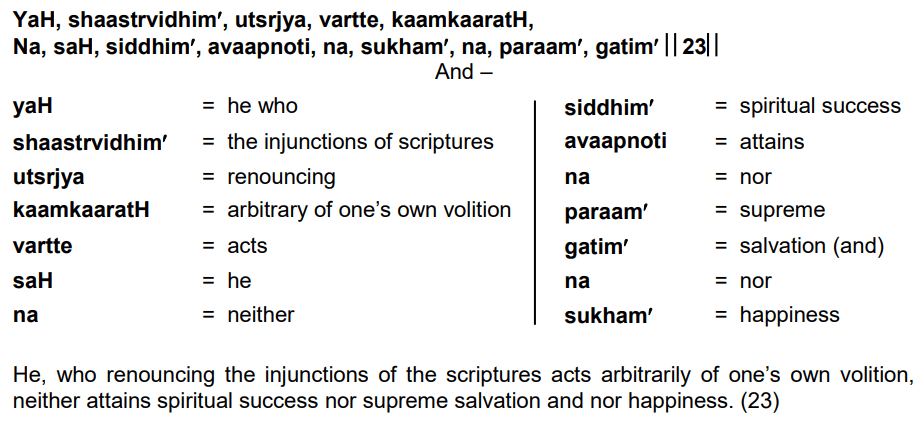
(Photocopy of Gita Chapter 16 Verse 24)
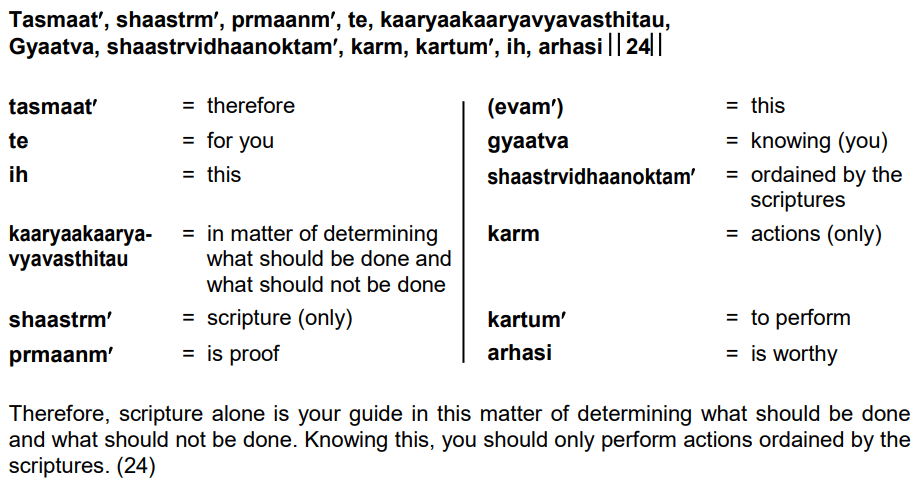
Hindu Brothers! Let us now read Holy Shrimad Bhagavad Gita Chapter 17 Verses 1-6
Gita Chapter 17 Verse 1: - In this verse, Arjun questioned the Lord who has given the knowledge of Gita that :-
- O Krishna! Those men who, endowed with faith, worship the gods etc abandoning the injunctions of the scriptures, what is their state then, Satvik, Rajsi or Tamsi? (Gita Chapter 17 Verse 1)
The answer to this has been given in verses 2-6. The answer of the Lord who is the knowledge-giver of Gita: -
-
In brief, it is as follows: - The faith of men according to the impressions of their previous birth is Satvik, Rajsi and Tamsi. (Gita Chapter 17 Verse 2)
-
O Bharat! The faith of all men is according to their inner-self. Whatever faith one has, he himself is also that only, meaning that he is of the same nature. (Gita Chapter 17 Verse 3)
-
Satvik men worship gods. Rajas men worship Yakshas and demons and the others, who are Tamas men, worship spirits and ghosts. (Gita Chapter 17 Verse 4)
-
O Arjun! Those men, who only practice (arbitrary) severe religious austerity, which is not enjoined by the scriptures, and endowed with hypocrisy and arrogance, who are also full of desire, attachment and pride of power (Gita Chapter 17 Verse 5)
-
And those who torture i.e. cause grief to the group of material elements situated in the body, and me (the God who is the giver of the knowledge of Gita), dwelling in their hearts, know those ignorants to have demoniac nature. (Gita Chapter 17 Verse 6)
The same evidence is also in Gita Chapter 16 Verses 17-20. It is said that:-
-
Verse 17: - Those, who consider only themselves to be superior, haughty men, intoxicated by wealth and honour, perform religious rituals only in name for ostentation, without following the injunctions of the scriptures. (Gita Chapter 16 Verse 17)
-
Verse 18: - Given to egotism, power, arrogance, anger etc, men who criticise others, hate me (the knowledge-giver of Gita) who resides in their body and in the bodies of others. (Gita Chapter 16 Verse 18)
-
Verse 19: - I hurl those haters, the sinful and cruel degraded men, repeatedly in demoniac wombs in the world. (Gita Chapter 16 Verse 19)
-
Verse 20: - O Arjun! Those fools, instead of attaining me, birth after birth attain the demoniac wombs. Then they attain a further lower state than that i.e. they fall into deep hell. (Gita Chapter 16 Verse 20)
Conclusion of the above verses of Gita: -
In Gita Chapter 17 Verse 1, Arjun has asked that O Krishna! Those men who, endowed with faith, worship the gods etc abandoning the injunctions of the scriptures, what is their nature like? Arjun had earlier heard in Gita Chapter 7 Verses 12-15 that the worshippers of the three Gunas i.e. Trigunmayi Maya i.e. Rajgun Brahma ji, Satgun Vishnu ji and Tamgun Shiv ji etc. are limited to them only. Their intellect does not rise above them to my, the knowledge-giver-of-Gita’s, worship. Those who have lost their knowledge, who are of demoniac nature, lowest among men, evil-doers, fools do not worship me.
In Gita Chapter 7 Verses 20-23, the following has been said :-
The verses 12-15 have been repeated in these. It has been said that those whose knowledge has been carried away by the desires of those respective pleasures, being prompted by their own nature, adopting that very rule, that is, based on folklores, they worship other deities. This is prohibited in Gita that one should not worship Rajgun Brahma ji, Satgun Vishnu ji and Tamgun Shiv ji and other gods and goddesses. They worship the deities based on folklore after hearing from someone. They worship the deities against the injunctions of the scriptures, that is, they behave arbitrarily, which has been described as a futile religious practice in Gita Chapter 16 Verses 23-24. In Gita Chapter 17 Verse 1, Arjun has asked a question about the same that O Krishna! Those who, abandoning the injunctions of the scriptures, worship other deities of their own volition, what is their devotion like i.e. is their state Rajsi, Satvik or Tamsi?
The meaning is that those who worship Shri Brahma ji Rajgun, Shri Vishnu ji Satgun and Shri Shiv ji Tamgun and other deities, that worship is indeed against the injunctions of the scriptures, but they who worship other deities (akartavya) which should not have been done, what is their temperament like?
The giver of the knowledge of Gita has made it clear in Gita Chapter 17 Verses 2-6 above that those who have Satvik faith i.e. who are good human beings, they only worship other gods. Others who are Rajsi in nature worship demons and Yakshas. Those who are of Tamsi faith i.e. nature, they worship spirits and ghosts.
{Keep in mind that performing Shraadh, Pind-Daan, the ritual of immersing the ashes of the deceased in the Ganges River by the Pandit, Terahnvi (the ritual on the thirteenth day after the death of a family member), Varshi (the ritual after a year of the death of a family member), all these are called Karmkand (ceremonial rituals) which have been prohibited in the Gita. In the Vedas, it is called a foolish practice.
Markandey Puran
Evidence: - In Markandey Puran, in the chapter “Origin of Rauchya Rishi”, Sage Ruchi while following celibacy, lived in seclusion and performed worship according to the Vedas. When he turned 40, his ancestors appeared in the sky. They said to Sage Ruchi (father, grandfather, great grandfather who were Brahmins i.e. sages. They used to perform (Karmkand) ceremonial rituals. Due to which, they did not attain salvation. They were suffering in the lives of ghosts and Pitras (deceased ancestors). They had destroyed their lives by abandoning the injunctions of the scriptures and behaving arbitrarily. They were extremely distressed. They said to Sage Ruchi), “Son! Why did you not get married? Why did you not perform our Shraadhs etc ceremonial rituals i.e. karmkand?” Sage Ruchi replied, “O Forefathers! In the Vedas, ceremonial rituals have been described as Avidya (foolish practice). Then why are you asking me to do this.” The (Pitras) deceased ancestors said, “Son Ruchi! It is true that ceremonial rituals have been called Avidya in the Vedas. The spiritual practice that you are performing is the path of salvation. We are in great trouble. Get us liberated, meaning that get married, and by performing rituals like our Pind-Daan etc, get us liberated from the life of a ghost.” They themselves had become ghosts by abandoning the injunctions of the scriptures and arbitrarily performing ceremonial rituals. They led their son Ruchi (who was doing scripture-based worship) to hell by making him forsake true worship. Sage Ruchi got married. Then he performed the rituals. Then he also became a ghost. By performing Pind-Daan, one gets rid of the life of a ghost. After that, a living being gets the life of an animal or bird etc. What sort of a liberation is this? It is said in Sukshm Ved that: -
Garib, bhoot yoni chhootat hai, pind pradaan karant |
Garibdas Jinda keh, nahin miley Bhagwant ||
It is also clear in Gita Chapter 9 Verse 25. Gita Chapter 9 Verse 25: - Those who worship gods, go to the gods. Those who worship Pitras (deceased ancestors), go to the Pitras. Those who worship ghosts, go to the ghosts, that is, they become ghosts. Those who worship me (the knowledge-giver of Gita) come to me. Therefore, it is beneficial to worship according to the scriptures. Do like this.}
-
In Gita Chapter 17 Verses 5-6, it has been clarified that those who practice arbitrary severe religious austerity, which is not enjoined by the scriptures, and the above-mentioned worshippers of other deities i.e. Rajgun Brahma Ji, Satgun Vishnu Ji and Tamgun Shiv Ji and other gods and goddesses, those who worship ghosts and Pitras (performing rituals like Shraadh etc is worship of ghosts and Pitras), and those who worship Yakshas and demons, they torture the group of elements (the powers that reside in the lotuses) located in the body and me, the giver of the knowledge of Gita, located in the heart. Know those ignorant people to be of demoniac nature. In Gita Chapter 16 Verses 17-20, you read this same topic. It has been said that those who worship contrary to the injunctions of the scriptures, they hate me (the giver of the knowledge of Gita) who resides in their body and in the bodies of others, because they worship other gods. They do not worship the knowledge-giver of Gita i.e. Kaal. That is why, they have been called the haters? I hurl those haters i.e. the sinful, cruel, degraded men, that is, the worshippers of Shri Brahma ji Rajgun, Shri Vishnu ji Satgun and Shri Shiv ji Tamgun,- the three main powers of Kaal Brahm, and other gods and goddesses, repeatedly in demoniac wombs. (Gita Chapter 16 Verses 17-19)
-
It has been stated in Gita Chapter 16 Verse 20 that O Arjun! Those fools, instead of attaining me, birth after birth attain the demoniac womb. Then they attain a further lower state than that i.e. they fall into deep hell.
If someone says that the worship of Shri Brahma ji, Shri Vishnu ji and Shri Shiv ji is not prohibited in the above chapters; it is mentioned about the worship of other gods:-
Answer: - The answer to this is that nowhere in the entire Gita has it been asked to worship Shri Brahma Ji, Shri Vishnu Ji and Shri Shiv Ji. Therefore, because of not being in the Gita scripture, their worship is against the injunctions of the scripture, which proves to be futile according to Gita Chapter 16 Verses 23-24. Then the Hindu brothers have not left any deity whom they do not worship. Hence proved “Hindu Brothers did not understand Gita Gyan-Vigyan (knowledge-special knowledge)”.
To understand the aforesaid topic of Gita i.e. for proof, please read and see the photocopies of the above-mentioned verses which are from Shrimad Bhagavad Gita Padchhed, Anvay which is printed and published by India's famous and reliable Gita Press Gorakhpur and translated by Shri Jayadayal Goyandka: -
(Photocopy of Gita Chapter 17 Verse 1)
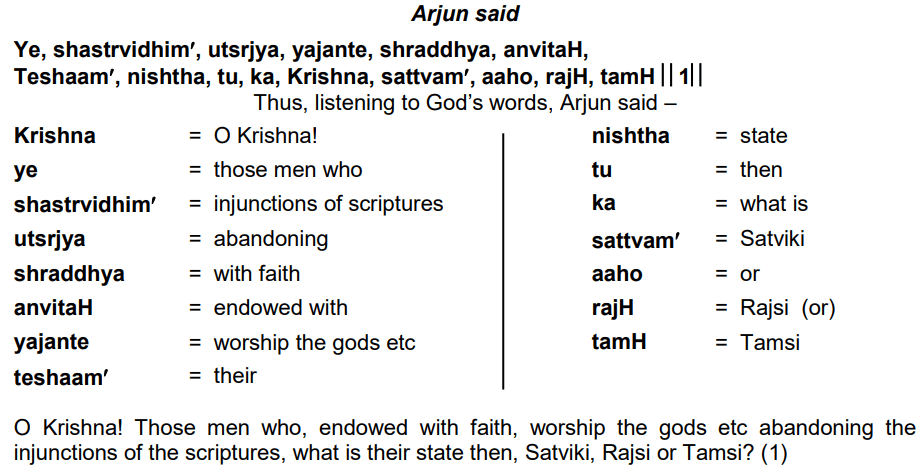
(Photocopy of Gita Chapter 17 Verse 2)
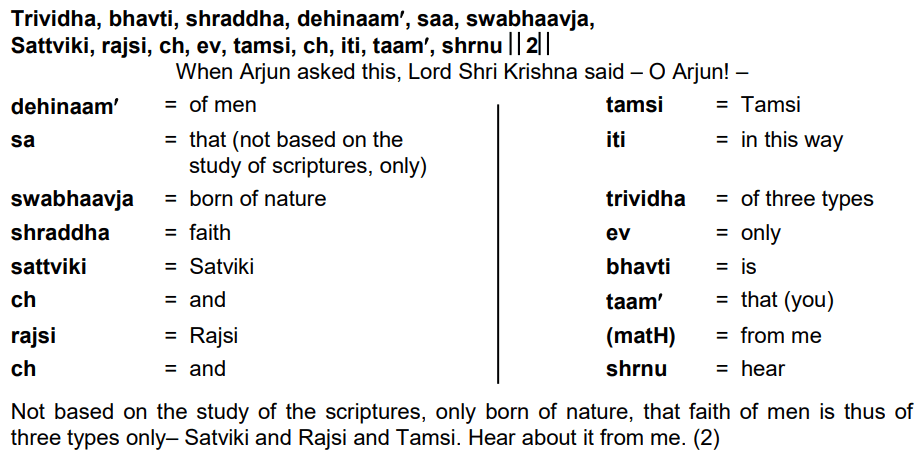
(Photocopy of Gita Chapter 17 Verse 3)
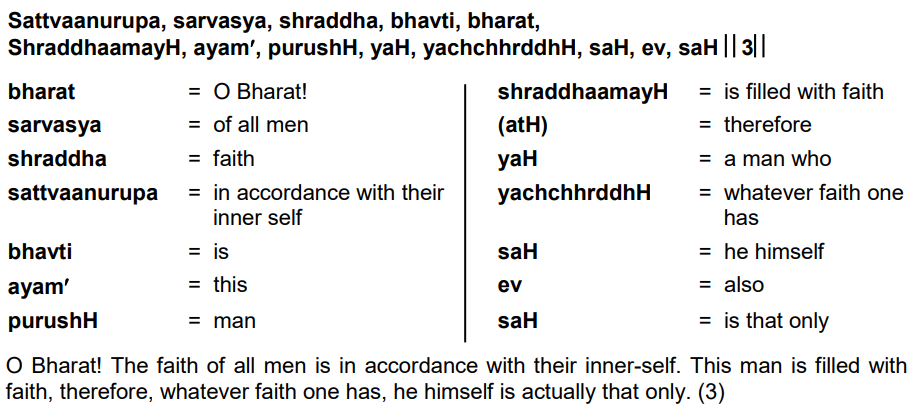
(Photocopy of Gita Chapter 17 Verse 4)
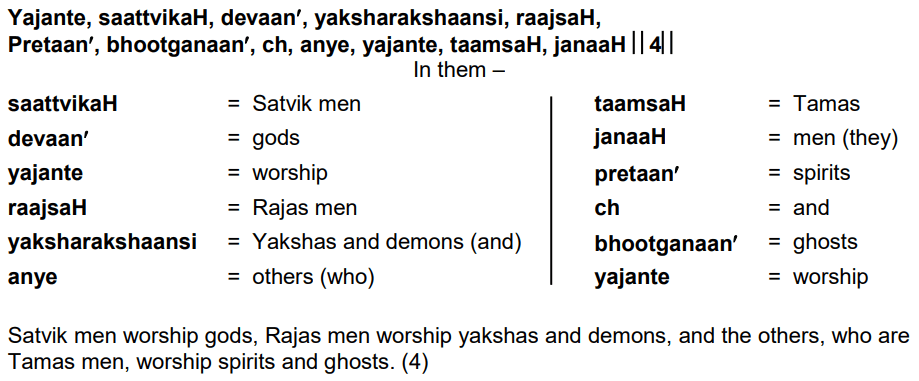
(Photocopy of Gita Chapter 17 Verse 5)
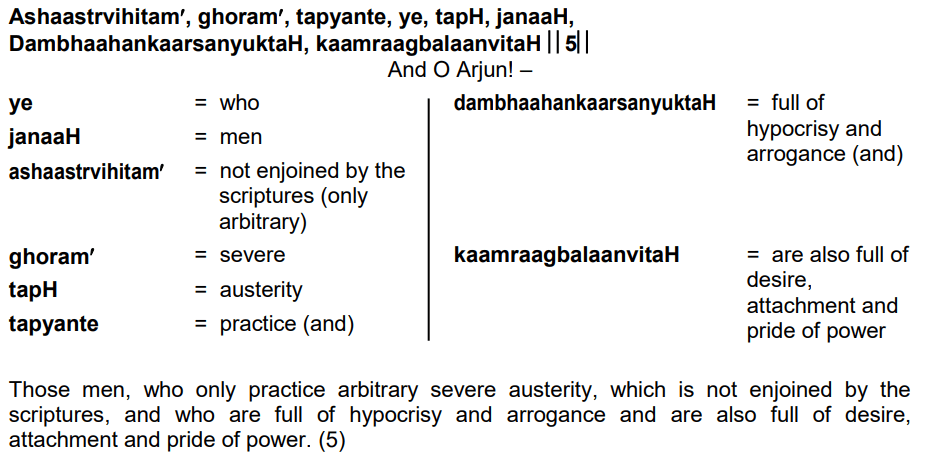
(Photocopy of Gita Chapter 17 Verse 6)
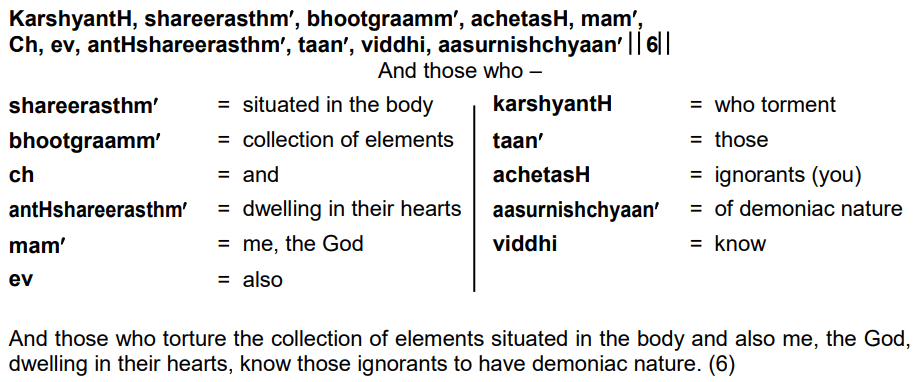
(Photocopy of Gita Chapter 16 Verse 17)
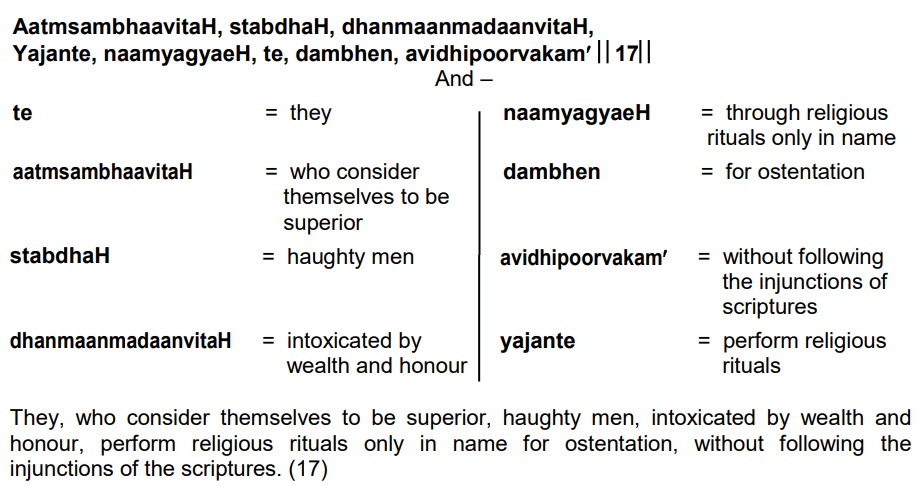
(Photocopy of Gita Chapter 16 Verse 18)
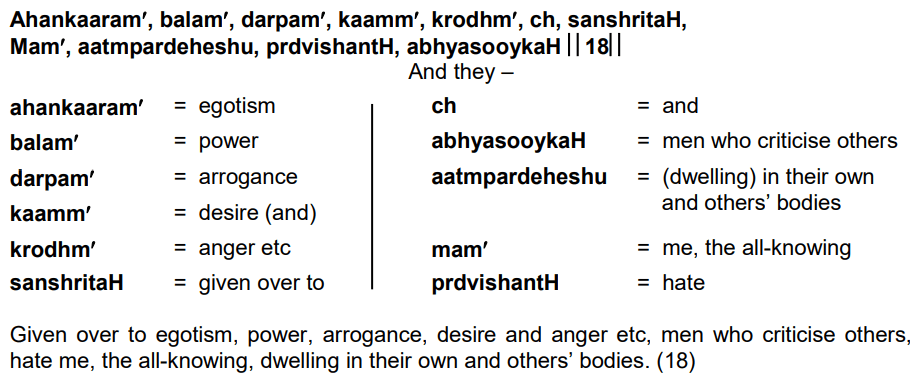
(Photocopy of Gita Chapter 16 Verse 19)
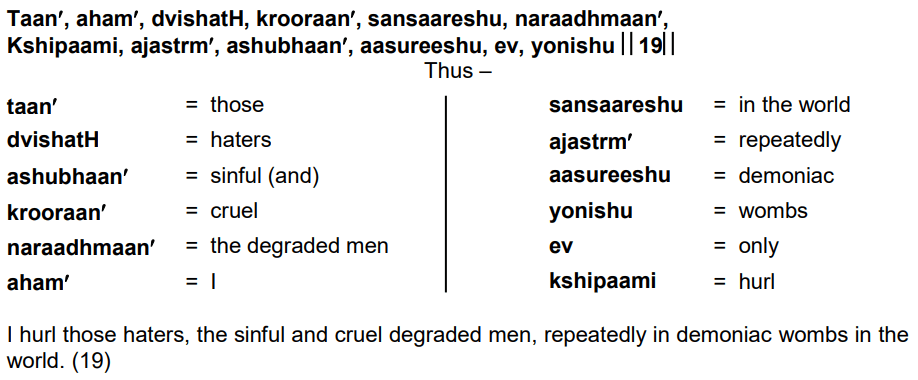
(Photocopy of Gita Chapter 16 Verse 20)
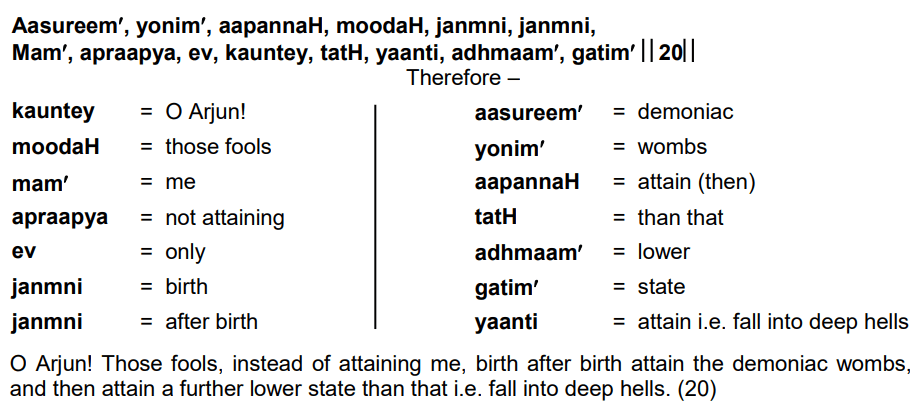
(Photocopy of Gita Chapter 16 Verse 23)

(Photocopy of Gita Chapter 16 Verse 24)

(Photocopy of Gita Chapter 7 Verse 12)
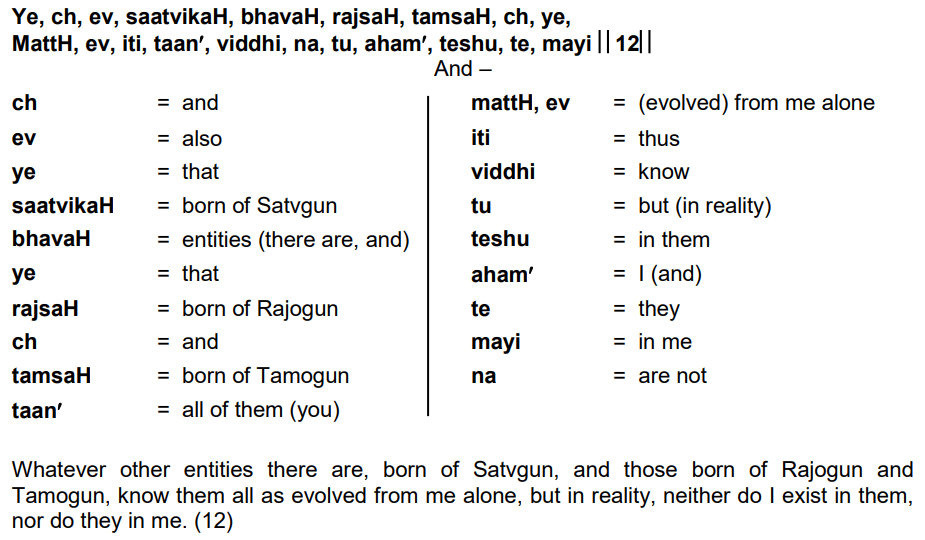
Important: - The giver of the knowledge of Gita has said that creation takes place from Rajgun Brahma ji, maintenance from Satgun Vishnu ji and destruction from Tamgun Shiv ji. All this is for me, so that I continue to have food. The giver of the knowledge of Gita is Kaal, who himself calls himself Kaal in Gita Chapter 11 Verse 32. Due to a curse, he eats one lakh humans every day. That is why, he has said that I am the cause of whatever is happening from Rajgun Brahma ji, Satgun Vishnu ji and Tamgun Shiv ji. But I am different from them (Brahma, Vishnu, Mahesh).
(Photocopy of Gita Chapter 7 Verse 13)
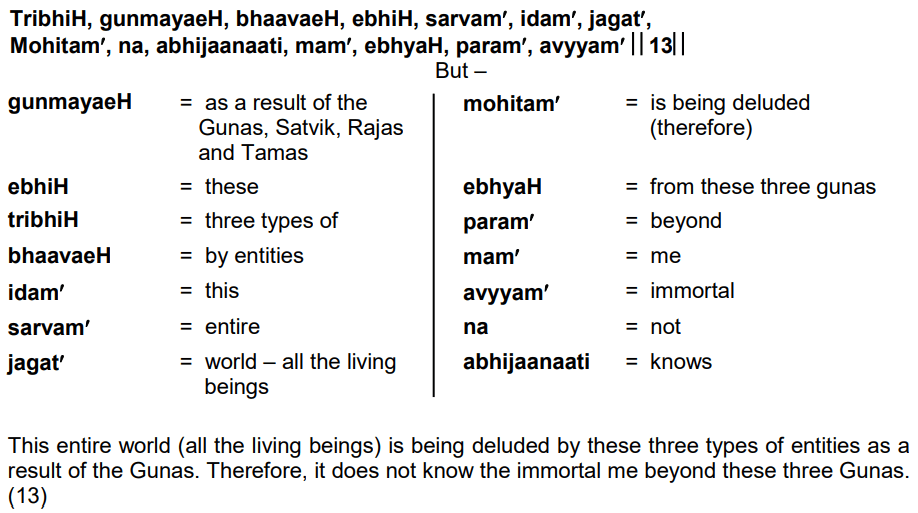
(Photocopy of Gita Chapter 7 Verse 14)
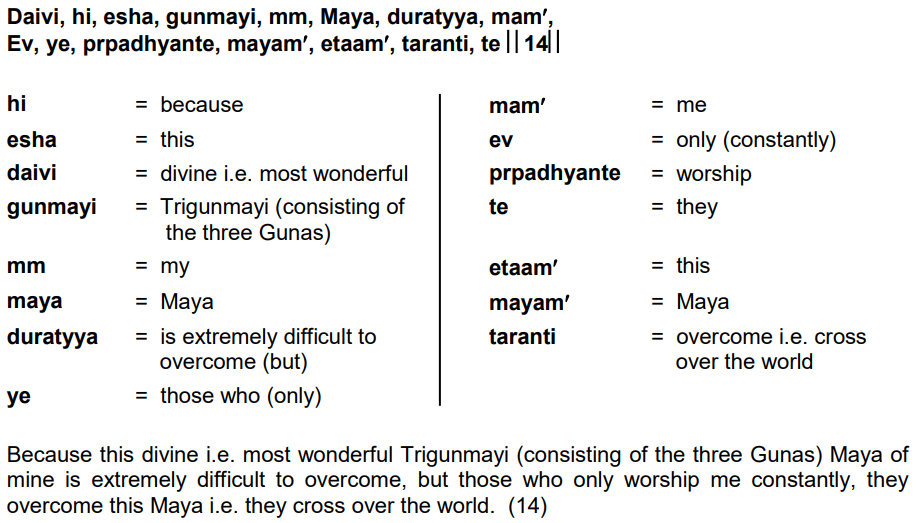
(Photocopy of Gita Chapter 7 Verse 15)
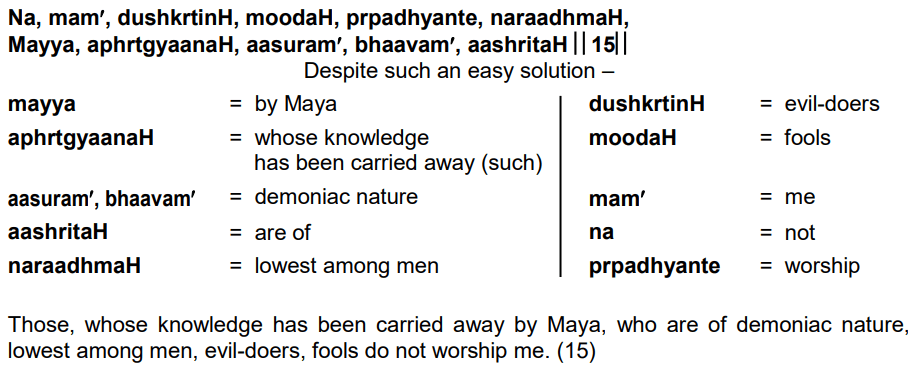
Important: - It has been clarified in this verse 15 that the devotees whose faith is steadfast in Rajgun Brahma ji, Satgun Vishnu ji and Tamgun Shiv ji and whose knowledge has been overpowered, on the basis of folklore, by this Trigunmayi Maya, they are firm on the worship of these three main gods and other deities. They do not worship me (the giver of the knowledge of Gita) who is above them. Such persons have demoniac nature, they are (NaraadhmaH) the lowest among men, evil-doers and fools. They do not worship me (Kaal Brahm, the knowledge-giver of Gita).
(Photocopy of Gita Chapter 7 Verse 20)
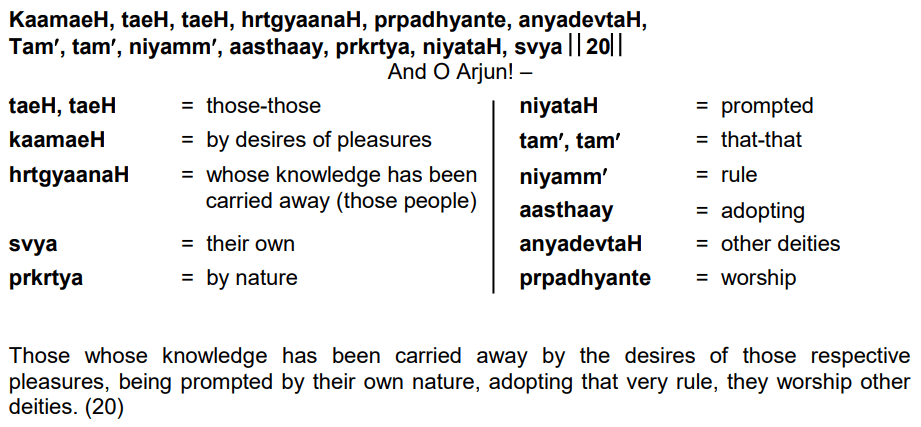
(Photocopy of Gita Chapter 7 Verse 21)
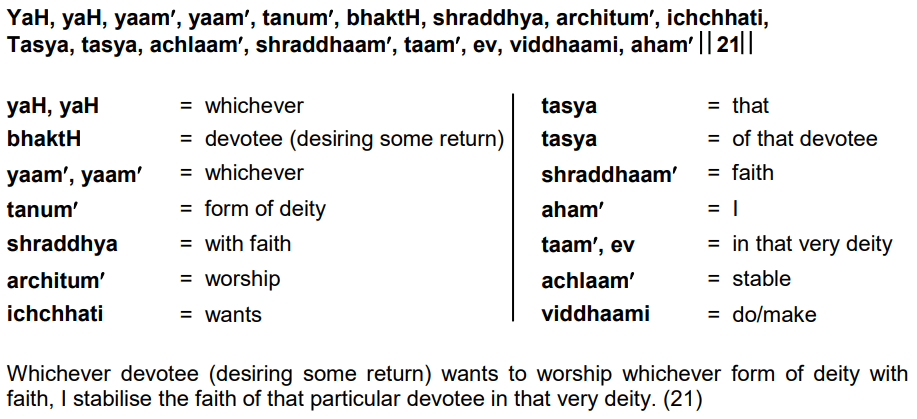
(Photocopy of Gita Chapter 7 Verse 22)
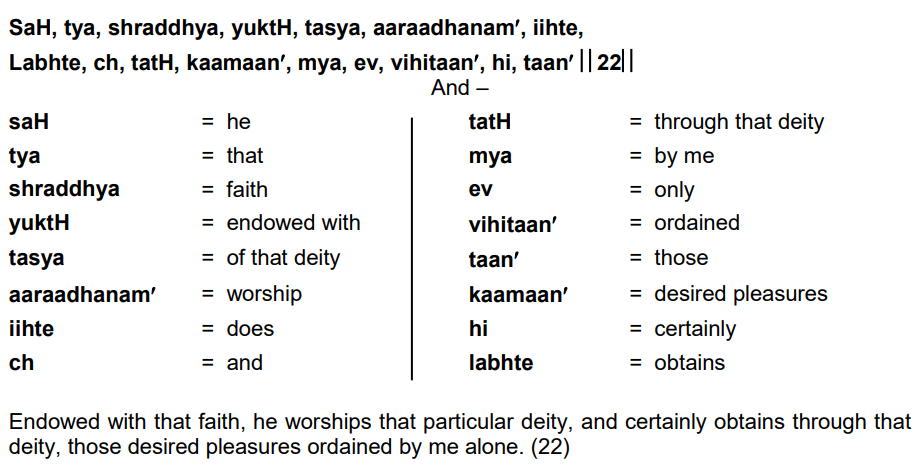
(Photocopy of Gita Chapter 7 Verse 23)
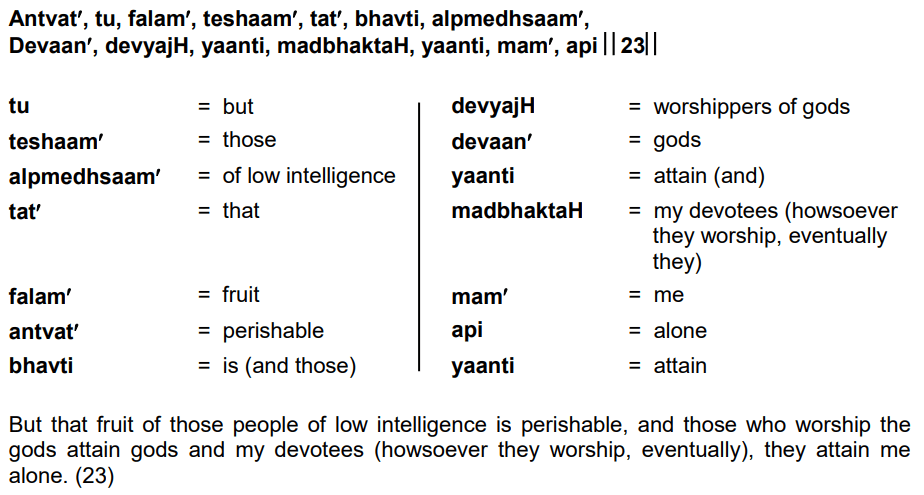
(Photocopy of Gita Chapter 7 Verse 25)
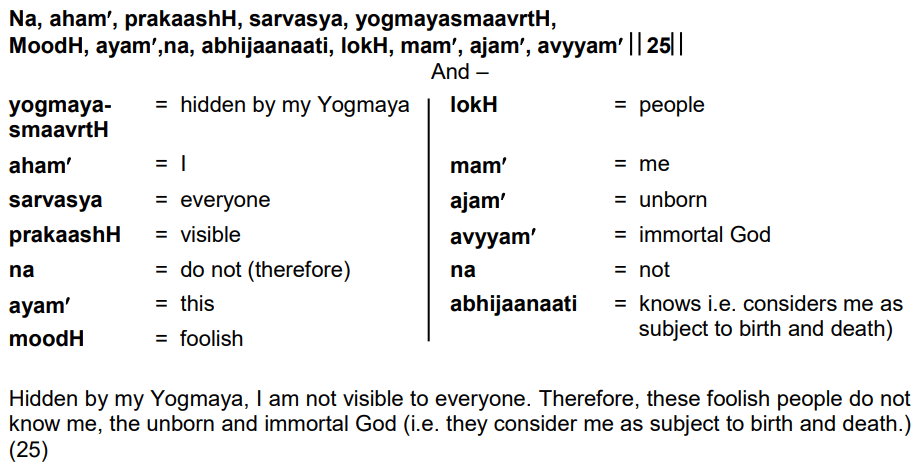
Special information:- Question:- Now the Hindu Brothers will say that performance of Shraadh and other rituals has been advocated in the Puranas. Going on pilgrimages has been described as a virtuous deed. The sages did meditation (religious austerity). Should we consider them wrong too? Shri Brahma ji, Shri Vishnu ji and Shiv ji also did meditation. Have they also been doing wrong? Answer: - It has been clarified above from Shrimadbhagavad Gita that those who practise severe religious austerity are fools, sinful and cruel. Whether it is Brahma, Vishnu, Shiv or any sage, they did not have any knowledge of the Vedas. How can others have it? It is nowhere written in the Gita to go on pilgrimages. Therefore, it is wrong to go on a pilgrimage. It is an arbitrary practice against the injunctions of the scriptures which is said to be useless in the Gita.
Question :- Are Puranas not scriptures?
Answer:- The knowledge of the Puranas is the personal experience of the sages. The knowledge of the Vedas and the Gita is given by God and is absolute truth. The sages read the Vedas. They did not understand them properly. Because of which, they performed religious practice based on folklores (hearsay). They took some knowledge from the Vedas i.e. they took Om (ॐ) mantra for chanting from Yajurved Chapter 40 Verse 15. They took the knowledge of doing meditation (religious austerity) from Brahma ji. They obtained (siddhis) spiritual powers by performing religious practices according to the jumbled knowledge and ruined their lives by cursing or blessing someone. It is mentioned in the Gita that those, who perform arbitrary spiritual practice by abandoning the injunctions of the scriptures, do not get any benefit. Those who practice severe religious austerity are of demoniac nature.
Evidence: - Once the Pandavas were in exile. At the behest of Duryodhan, Sage Durvasa went to the Pandavas' place with eighty-eight thousand sages. He had gone with this wicked thought that the Pandavas would not be able to feed us as per my wish. So, I will curse them, and they will perish.
Please think: - Durvasa was a great ascetic. That practitioner of severe religious austerity, sinful and degraded man thought of inflicting such an atrocity. He went with the aim of making the distressed even more miserable. Was it not a demonic act? Was he not a cruel and vile man?
This very Sage Durvasa cursed the Yadavas out of anger because of the children playing a prank on him. The mistake was made by three-four children (Pradyuman, son Shri Krishna, etc.), but he gave the curse for the entire Yadav clan to be destroyed. Due to Durvasa’s curse, 56 crore (fifty-six crore) Yadavs died fighting with each other. Shri Krishna ji was also killed. Was this not a demonic act of Durvasa?
Listen to other actions of the sages who composed the Puranas:-
Sage Vashishth
Sage Vashishth cursed a king to become a demon. He suffered as a demon. Sage Vashishth cursed another king to die because instead of getting his religious rite performed by Sage Vashishth, he got it done by someone else. That king cursed Sage Vashisth to die. Both died. Vashishth ji was reborn as follows which is a Puranic story:- Two sages were doing (Tap) religious austerity in the forest. An Apsara (celestial nymph) came from heaven. She was very beautiful. Just by seeing her, both the sages ejaculated. Both of them went one by one and released their semen in an empty pitcher kept in the hut. From it, one was the rebirth of the soul of sage Vashishth. He was named Vashishth only. The other one born was named Sage Kumbhak.
Deeds of Sage Vishwamitra:-
Renouncing the kingdom, he went to the forest. He did intense meditation and achieved spiritual powers. Sage Vashishth called him a Raj-Rishi (Royal-Sage, a sage who hails from a royal background). Getting furious with him, he killed hundred sons of Vashishth with sticks and stones. When Sage Vashishth called him Brahm-Rishi (a sage who has realised Brahm/God), he became pleased because Vishwamitra used to consider himself insulted by being called a Raj-Rishi. He wanted to be called a Brahm-Rishi.
Please think! Is this not a demonic deed? The eighteen Puranas are the creations of such sages.
Sage Vishwamitra
Once upon a time, Sage Vishwamitra was sitting in a hut in the forest. An Urvashi (celestial nymph) named Menaka came from heaven and was roaming near the hut. Vishwamitra fell in love with her. They behaved like husband and wife. A girl child was born. They named her Shakuntala. When the daughter was six months old, Urvashi returned to heaven. She said my work is done. Indra had sent me to find out about your status (self-control); I have seen it. It is said that Vishwamitra kept that girl in front of Sage Kanva's cottage and again went deep into the forest to do meditation. She was brought up and married to King Dushyant.
Please think: - Earlier, he had come after doing intense meditation deep in that forest itself. Soon after coming, he murdered Vashishth’s sons. Then he got entangled with Urvashi. After ruining himself, he then again went to waste his time. Had he then gone to the forest after reading Gita? He performed an arbitrary practice contrary to the injunctions of the scriptures based on that same folklore (hearsay knowledge).
Sage August
There has been a Sage August. He attained spiritual powers (siddhis) by doing (Tap) penance. He drank all the seven oceans in one gulp. Then filled them back in order to get fame. Is this salvation?
Purans are the personal ideologies of such sages. The knowledge in Puranas that does not match with the Vedas and the Gita, is Lok Ved (folklore). One should abandon it.
The contemporary religious preachers, Gita Manishis, Acharyas, Shankaracharyas and Mahamandaleshwars of the Holy Hindu religion are propagating the Lok Ved (legends/ folklore) received from these sages, and the followers of the Hindu religion i.e. Hindus are lugging the same ignorance, which has been described as an arbitrary behaviour in the Gita and is said to be a futile practice.
Hindu Brothers did not Understand Bhagavad Gita
The Giver of the Knowledge of Gita has Advised to Go in the Shelter of Supreme God Other Than Him
The contemporary Gita Manishis and Shankaracharyas of Hindu religion do not even know in which God’s shelter, the giver of the knowledge of Gita has asked to go in Gita Chapter 18 Verse 62 other than himself. They say that there is no God other than Shri Vishnu alias Shri Krishna i.e. the giver of the knowledge of Gita.
The reality is as follows :-
Hindu Brothers did not Understand the Knowledge of Bhagavad Gita
The knowledge-giver of Gita had told Arjun in Gita Chapter 7 Verse 29 that "those worshippers who want to become free (moksh) from (jaraa) old age and (maran) death are familiar with Tat Brahm, complete spirituality and all the actions.”
Arjun asked a question in Gita Chapter 8 Verse 1 that – What is ‘Tat Brahm’ that has been mentioned in Gita Chapter 7 Verse 29? The Lord, who is the knowledge-giver of Gita, has given its answer in Gita Chapter 8 Verse 3 that He is "Param Akshar Brahm".
After this, in Gita Chapter 8 Verses 5, 7, the Giver of the knowledge of Gita has asked Arjun to do his bhakti, and in this same Chapter 8 Verses 8, 9, 10, he has advised to do bhakti of Param Akshar Brahm i.e. Sachidanand Ghan Brahm (Complete God) other than him. He has also clarified that the one who worships me, comes to me. He who worships Tat Brahm i.e. Param Akshar Brahm, goes to Him. Then he has told one letter ‘Om’ (ॐ) as mantra for his worship, and for the worship of the Tat Brahm (Param Akshar Brahm / Divine Supreme God / Sachidanand Ghan Brahm) he has told the mantra "Om (ॐ) Tat Sat".
In Gita Chapter 18 Verse 62, the giver of the knowledge of Gita has told that it is only possible to attain supreme peace and (Shashvatam Sthanam) the eternal supreme abode (which Sant Garibdas ji has called Satyalok / Amarlok) by going in the shelter of that same Param Akshar Brahm.
Sant Rampal Ji has given the above-mentioned knowledge and shown it in Holy Book Gita in videos through spiritual discourses. He has shown it to us i.e. Hindus and explained it by drawing conclusions. What our Hindu religious preachers / teachers / Manishis and Mandaleshwars could not understand, Das (the author) has understood.
Hindu Brothers may kindly read the photocopies of the above-mentioned verses: -
(Photocopy of Gita Chapter 7 Verse 29)
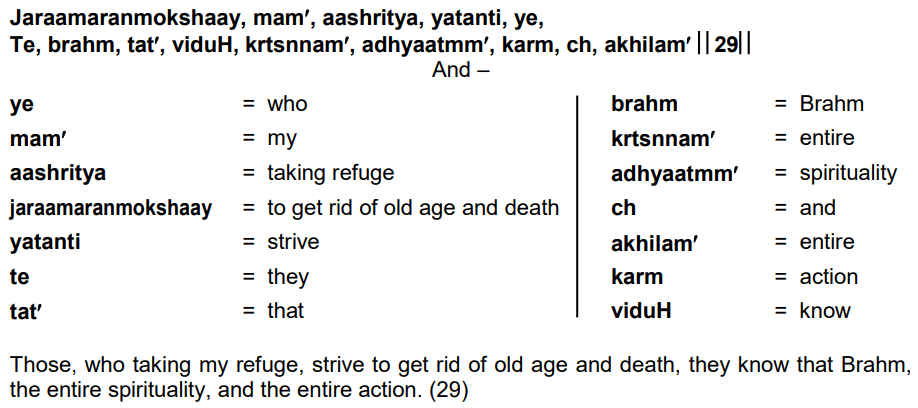
(Photocopy of Gita Chapter 8 Verse 1)
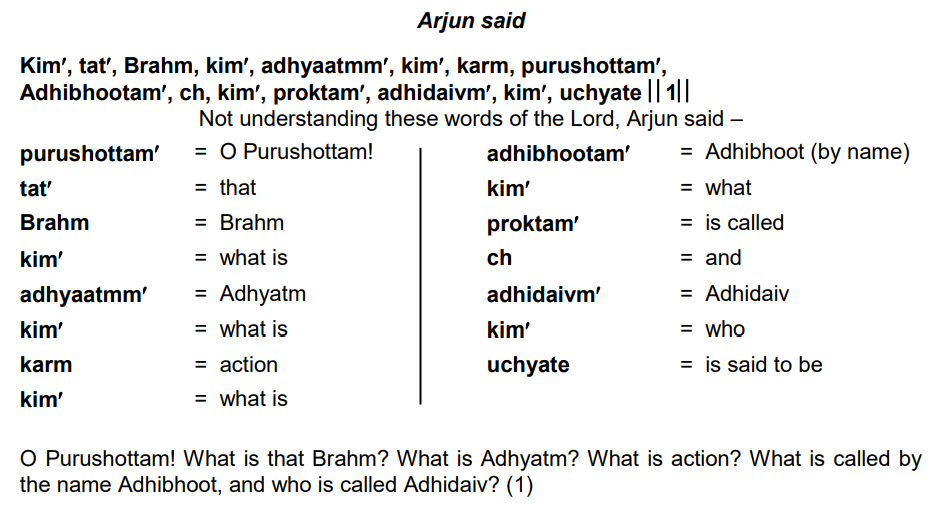
(Photocopy of Gita Chapter 8 Verse 3)
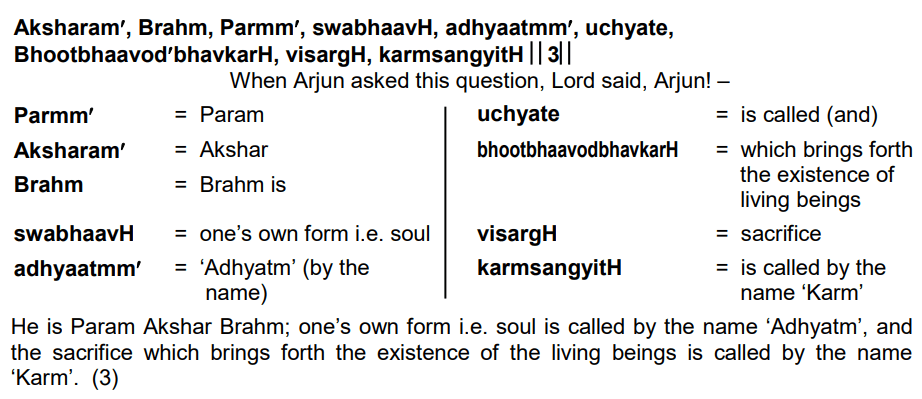
(Photocopy of Gita Chapter 8 Verse 5)
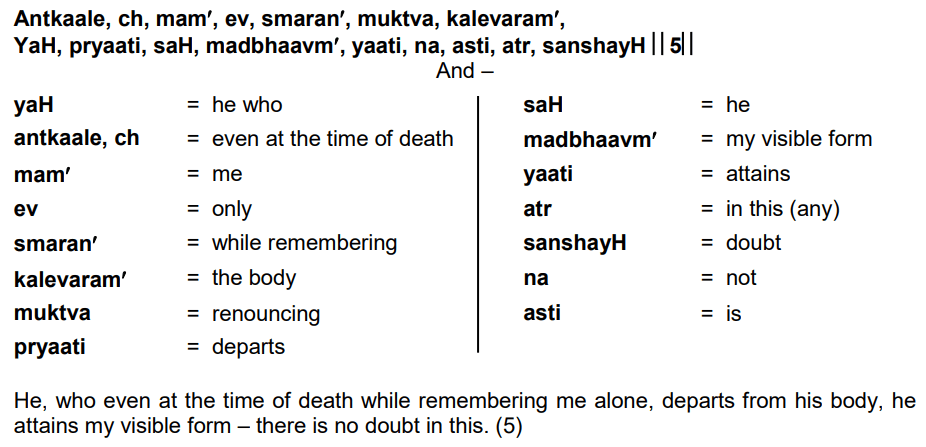
(Photocopy of Gita Chapter 8 Verse 7)
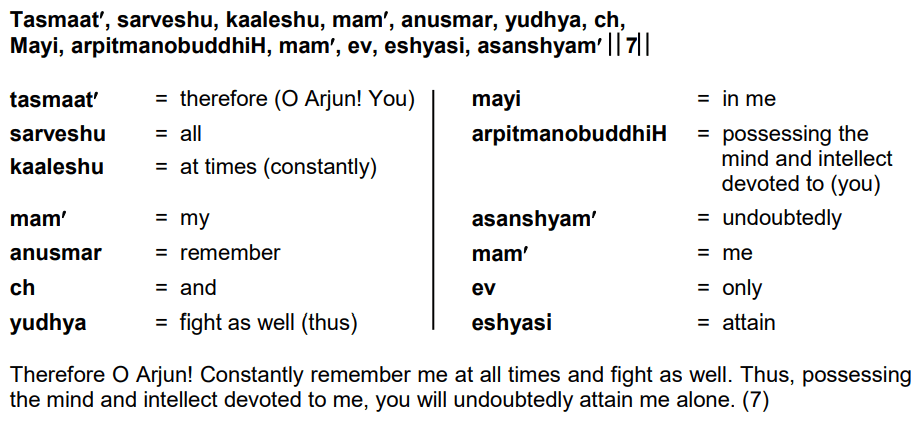
(Photocopy of Gita Chapter 8 Verse 8)
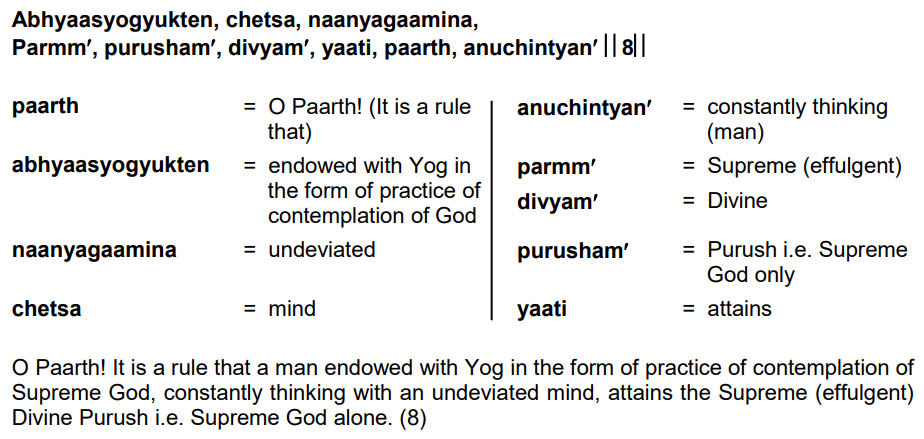
(Photocopy of Gita Chapter 8 Verse 9)
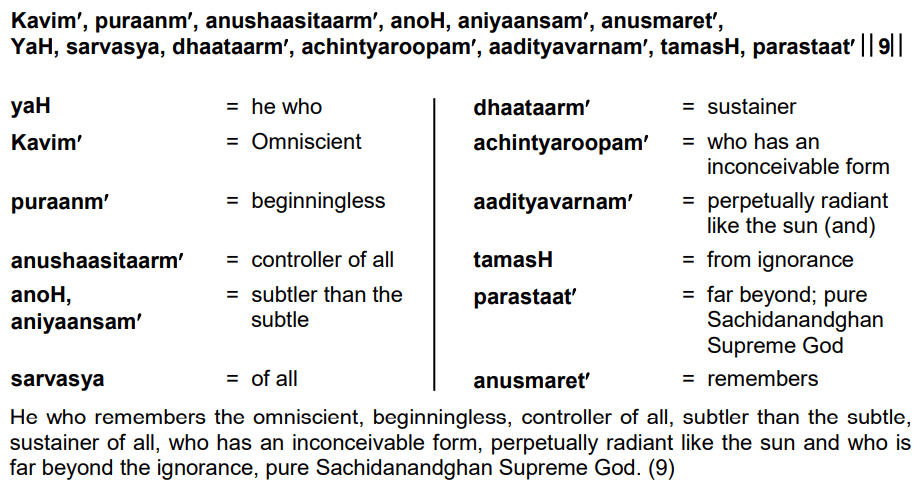
(Photocopy of Gita Chapter 8 Verse 10)
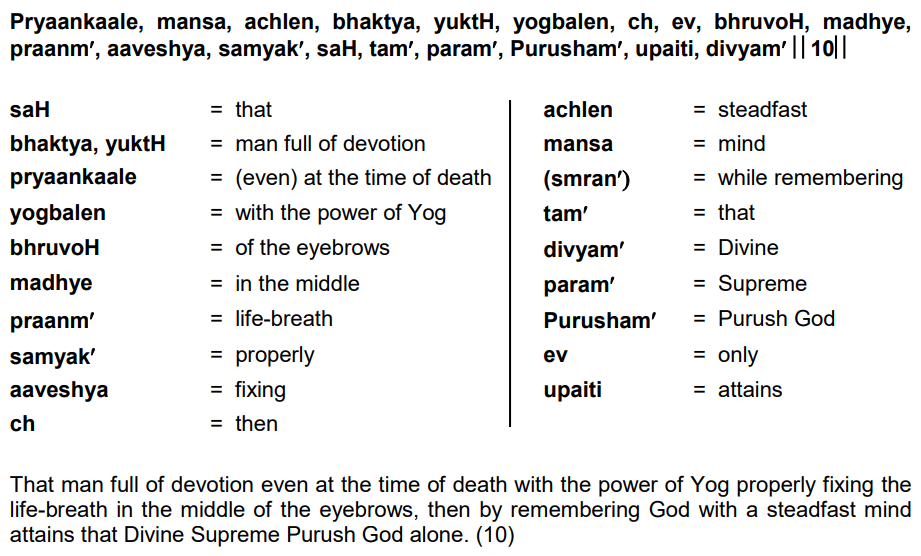
It becomes clear from this - “Hindus did not understand the knowledge of Gita”. {Scholar Sant Rampal Das understood this.}
Important:- Hindu Brothers! The danger of the cat is not averted by the pigeon closing its eyes. This is its illusion.
Look at the truth with your own eyes. Accept it. You are educated. You are a civilized and educated person of the 21st century. India today is not the same as that of two hundred years ago, when our ancestors were uneducated and had completely pure souls. Considering our ignorant religious preachers / Mandaleshwars / Manishis / Acharyas / Shankaracharyas to be complete scholars / Gita Manishi, our ancestors blindly believed their lies and by performing the arbitrary religious practices told by them forsaking the scriptural injunctions, they destroyed their precious lives, and we blindly started following the tradition of our ancestors. The entire pious Hindu society is misled by these gurus who are devoid of true spiritual knowledge. At least open your eyes now. You should read the Gita again. You will find out that in Gita Chapter 16 Verses 23-24, it has been said that O Arjun! The one, who abandoning the scriptural injunctions, follows arbitrary conduct (worship), he neither gets happiness, nor does he get siddhi (accomplishment of task from true scripture-based practice), nor does he attain salvation (moksh).
Hindu Brothers, please think! Devotional worship is done for these three things only
- To get happiness in life.
- Tasks to get accomplished; to have no crisis.
- To get salvation.
By performing religious practices and worship not prescribed in the scriptures, one will not get all these three things. Therefore, one should not do what is not prescribed in the Gita. This has also been clarified in Gita Chapter 16 Verse 24. It has been stated that:-
Gita Chapter 16 Verse 24: - Thus, for you, O Arjun! Scripture alone is the evidence in determining Kartavya (which religious practice should be performed) and Akartavya (which religious practice should not be performed).
- Hindu religious leaders and preachers, Acharyas, Shankaracharyas and Gita Manishis describe the Giver of the knowledge of Gita (whom they call Shri Krishna, the incarnation of Shri Vishnu) as immortal. They say that he does not have birth or death. He does not have any mother-father which is a lie.
You may see for yourself in Gita Chapter 2 Verse 12, Gita Chapter 4 Verse 5, Gita Chapter 10 Verse 2, the knowledge-giver of Gita (according to them Shri Vishnu alias Shri Krishna ji) says that
-
“O Arjun! You and I have had many births; you do not know, I know. (Gita Chapter 4 Verse 5)
-
O Arjun! It is not that I, you and all these kings and soldiers were not there before or will not be there in the future. Meaning, I (the knowledge-giver of Gita), you (Arjun) and all these soldiers etc were born earlier also, and will be born in the future as well. (Gita Chapter 2 Verse 12)
-
Neither sages, nor siddhs, nor the deities know my origin because I am the prime cause (originator) of all these. (Gita Chapter 10 Verse 2)
Hindu Brothers! Please read the photocopies of the aforesaid verses that is, Gita Chapter 16 Verse 24, Gita Chapter 4 Verse 5, Gita Chapter 2 Verse 12, Gita Chapter 10 Verse 2 of Shrimad Bhagavad Gita Padchhed Anvay, which is printed from Gita Press Gorakhpur and translated by Shri Jayadayal Goyandka: -
(Photocopy of Gita Chapter 16 Verse 24)

(Photocopy of Gita Chapter 2 Verse 12)
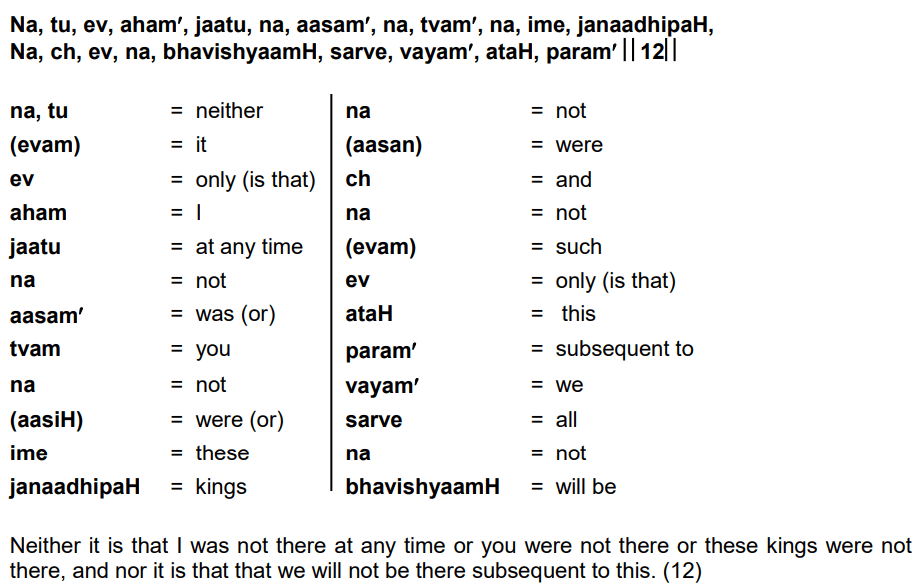
(Photocopy of Gita Chapter 4 Verse 5)
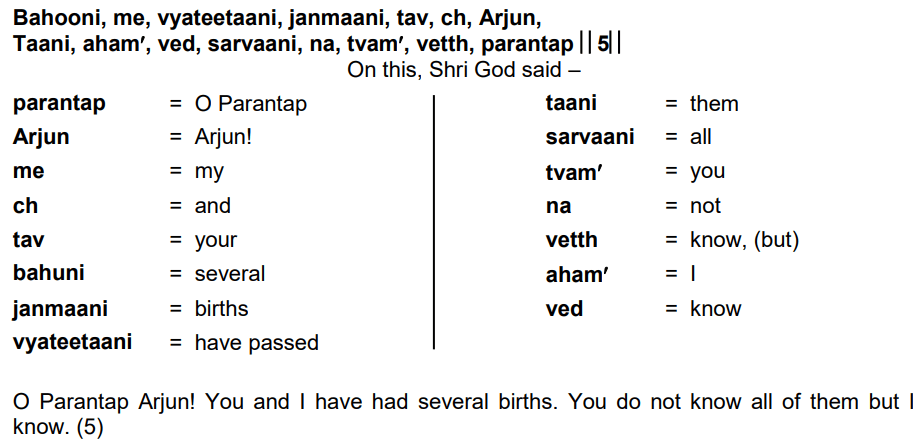
(Photocopy of Gita Chapter 10 Verse 2)
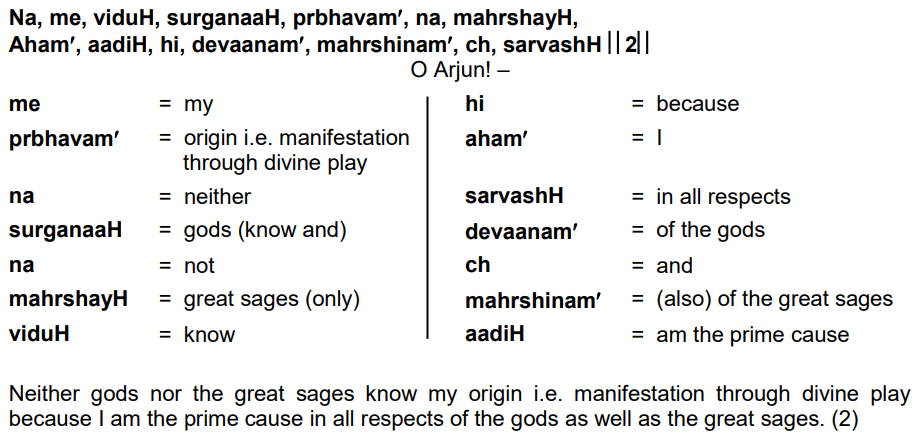
Readers, please think! The one, who takes birth and dies, is not immortal. He is perishable. He who is perishable cannot be the Almighty.
Question: - If the giver of the knowledge of Gita (Shri Vishnu alias Shri Krishna ji) takes birth and dies, that is, he is perishable, then who is the Lord who is imperishable, that is, free from birth and death other than the giver of the knowledge of Gita?
Answer: - This answer is in Gita Chapter 2 Verse 17 and Gita Chapter 15 Verses 16-17 and Gita Chapter 18 Verses 46, 61 and 62.
Gita Chapter 2 Verse 17: - (The giver of the knowledge of Gita has described the glory of God other than himself.) Know only Him to be immortal from whom this entire world has pervaded. No one is capable of destroying this immortal. {In Gita Chapter 18 Verse 46 also, the giver of the knowledge of Gita has described the glory of God other than himself.}
Gita Chapter 18 Verse 46: - The God from whom all the living beings have originated (and) from whom this entire world has pervaded, by worshipping that God through the performance of one’s natural activities, a man attains supreme spiritual success.
Gita Chapter 18 Verse 61: - {The giver of the knowledge of Gita has described the glory of God other than himself.}
O Arjun! God is situated in the heart of all the living beings, causing all the living beings mounted on the body-like machine to revolve (according to their deeds) by His Maya (illusory power).
Gita Chapter 18 Verse 62: - {In this verse, the giver of the knowledge of Gita has told Arjun to go in the refuge of God other than himself in every respect.} O Bharat! Go in the refuge of that God in every respect. (Only) By the grace of that God, you will attain supreme peace (and) the eternal supreme abode i.e. Satyalok (eternal place).
“Proof of - God other than the giver of the knowledge of Gita, the Imperishable, and the One who sustains all, and only He is God.”
In Gita Chapter 15 Verse 16-17 :-
In Gita Chapter 15 Verse 16, it is said that there are two Purushs (Lords) in this world. One is Kshar Purush and the other is Akshar Purush. Both these and all beings under them are perishable.
In Gita Chapter 15 Verse 17, the giver of the knowledge of Gita has clarified that:-
Gita Chapter 15 Verse 17 :- Uttam Purush i.e. Supreme God is other than the above Kshar Purush and Akshar Purush who is called Parmatma. He enters the three worlds and sustains everyone, and He alone is the Immortal God.
Hindu Brothers! Please read the photocopies of the above verses for proof, from Shrimadbhagvad Gita Padchhed Anvay which is published from Gita Press Gorakhpur and translated by Shri Jayadayal Goyandka:-
(Photocopy of Gita Chapter 2 Verse 17)
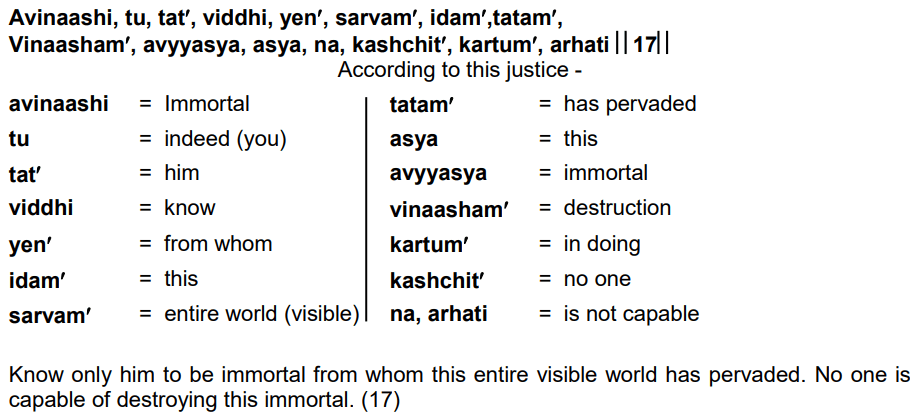
(Photocopy of Gita Chapter 18 Verse 46)
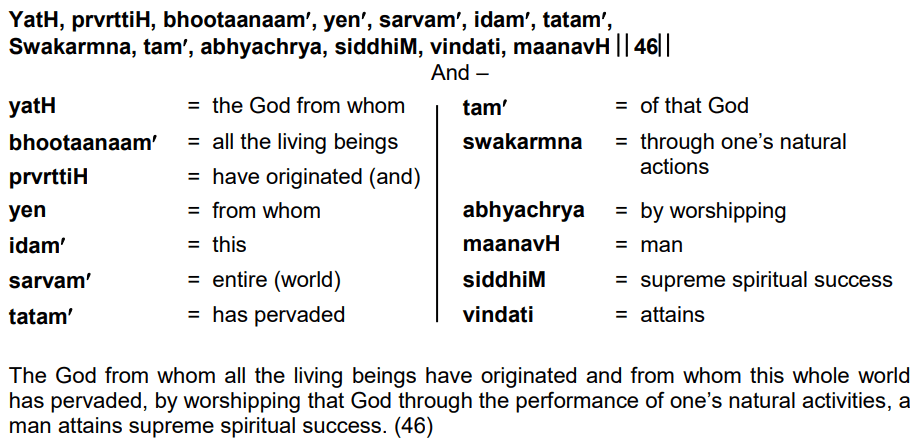
(Photocopy of Gita Chapter 18 Verse 61)
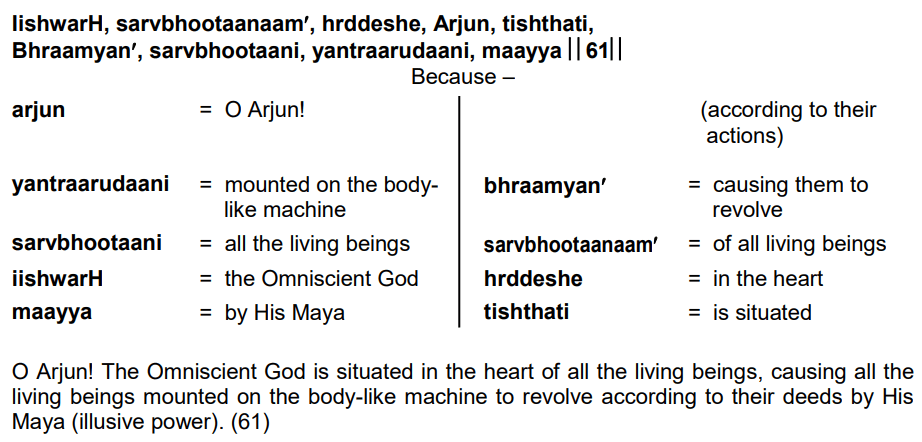
(Photocopy of Gita Chapter 18 Verse 62)
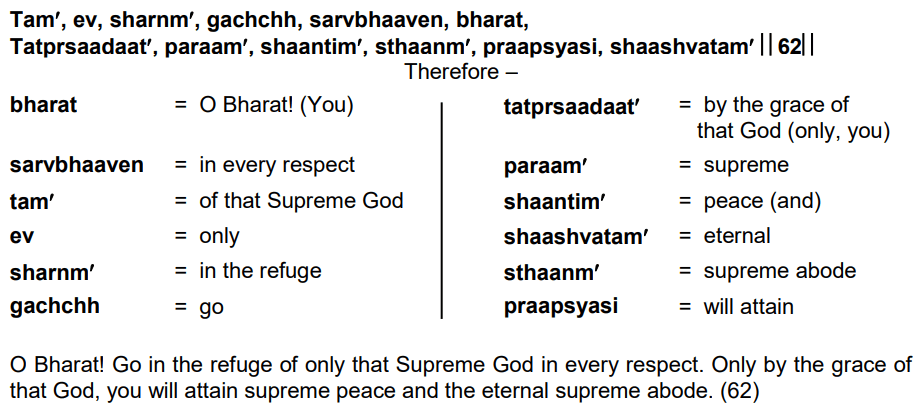
(Photocopy of Gita Chapter 15 Verse 16)
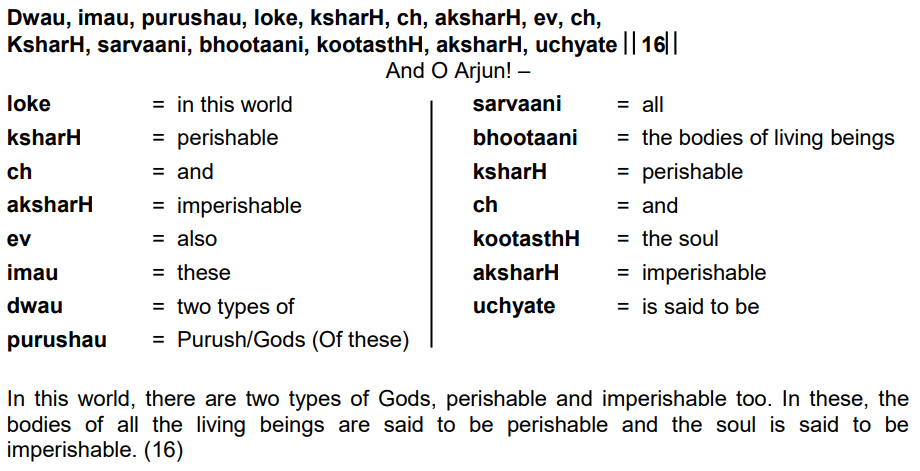
(Photocopy of Gita Chapter 15 Verse 17)
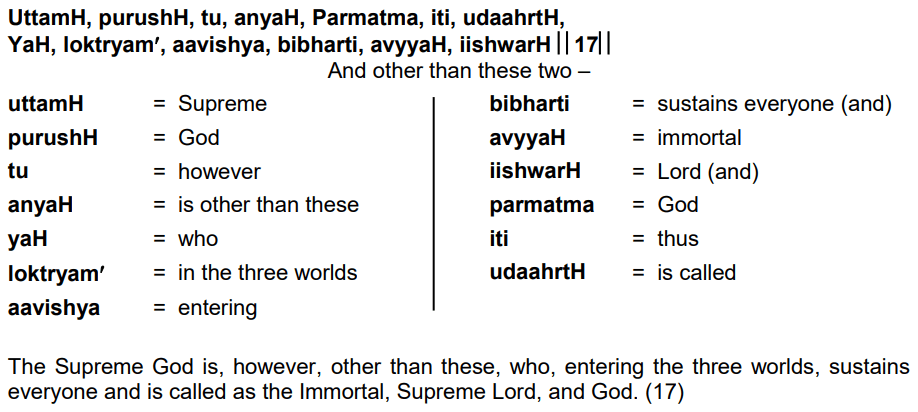
Removing the misconception: - In Gita Chapter 15 Verse 18, the giver of the knowledge of Gita has said that I am famous as Purushottam based on Lokved (legends) because I am the best of all living beings under me.
Please think:- In Gita Chapter 8 Verse 3, the giver of the knowledge of Gita has described Param Akshar Brahm (Purush) as different from himself. In verses 5-7, he has advised to do his worship, and in verses 8-9-10 of Gita Chapter 8 itself, he has advised to worship Param Akshar Brahm i.e. Param Akshar Purush / Sachidanand Ghan Brahm i.e. Divya Param Purush (Supreme God). In Gita Chapter 8 Verse 9 also, he has described Him to be the one who sustains everyone. Similarly, in Gita Chapter 15 Verse 17, he has called the Param Akshar Purush other than himself as Purushottam. He has called Him alone as the Immortal God who sustains everyone. Then in Gita Chapter 15 Verse 18, he has explained his position that I am famous as Purushottam on the basis of Lok Ved (hearsay / folklores). {Actually, Purushottam has been mentioned above in Gita Chapter 15 Verse 17.}
Some people on reading verse 18 say - Look! The giver of the knowledge of Gita is calling himself Purushottam. There is no Purushottam other than him. The answer to his foolish thought has been elucidated above.
Question:- In the scriptures, which devotional actions (kartavya) are worth doing and which actions (akartavya) are not worth doing?
Answer:- In Shrimad Bhagavad Gita Chapter 8 Verse 13, the Lord who gave the knowledge of Gita has only told one letter ॐ (Om) to be chanted for his worship. Apart from this, other mantras are (akartavya) not to be chanted.
In Gita Chapter 3 Verses 10-15, performance of Yagya (religious ritual) is said to be (kartavya) an act of worship worthy of doing. It has been advised to establish (Param Akshar Brahm) the Immortal God in the form of God in them.
There are five types of Yagya:-
- Dharm Yagya
- Dhyaan Yagya
- Havan Yagya
- Pranaam Yagya
- Gyan Yagya.
A Tatvdarshi Saint tells the method of doing these. This evidence is also in Gita Chapter 4 Verses 32-33-34. It has been said that Sachidanand Ghan Brahm (Supreme God) explains Tatvgyan (true spiritual knowledge) in the speech spoken from His lotus-mouth. It leads to complete salvation. After knowing it, you will become completely free from the bondage of actions. (Gita Chapter 4 Verse 32)
Gita Chapter 4 Verse 33:- O Parantap Arjun! Gyan Yagya (Yagya of knowledge) i.e. listening to the sermon of a Tatvdarshi Saint is superior to a Dravyamay Yagya (religious ritual performed by spending money), because a Tatvdarshi Saint tells the scriptural method of doing meritorious deeds and chanting mantra etc. For example, due to lack of knowledge, Karna (the sixth Pandav) only donated gold. As a result, he was left on a mountain of gold in heaven. When he became hungry, he asked for food. He was told that you did not (Dharm Yagya) donate food. You only donated gold. Therefore, you will not get food. If Karna had found a Tatvdarshi Saint, he would have attained complete salvation by doing all the five yagyas. Therefore, it has been said in Gita Chapter 4 Verse 33 that Gyan Yagya is superior to Dravyamay Yagya, that is, (Gyan Yagya) by listening to the knowledge of a Tatvdarshi Saint, one finds out which devotional actions are according to the injunctions of the scriptures?
In Gita Chapter 4 Verse 34, it has been said that understand that Tatvgyan (true spiritual knowledge), which Sachidanand Ghan God narrates by uttering speech through His mouth, and which is written in that speech, by going to Tatvdarshi Saints. By duly prostrating oneself before them, by serving them and giving up deceit, asking them questions with simplicity, those knowledgeable Mahatmas, who know the essence of God, will instruct you in that Tatvgyan (true spiritual knowledge).
That Tatvgyan (true spiritual knowledge) is available with me (author- Rampal Das) which Sachidanand Ghan Brahm Kabir ji Himself has narrated in Sukshmved (Swasamved) by uttering speech i.e. Kabir Vaani from his lotus-mouth and which has been written by Shri Dharmdas ji (of Bandhavgarh). Then God Kabir ji had told the same knowledge to his beloved soul Sant Garibdas ji and had shown His Satyalok to him. Then Sant Garibdas ji described the eye-witnessed glory of Kabir ji. There is complete spiritual knowledge in Sukshmved. The knowledge of the four Vedas (Rigved, Yajurved, Samaved and Atharvaved) has been taken from the Sukshmved. But majority of the knowledge has been omitted. To compensate for that, Supreme God had Himself come to earth and imparted complete spiritual knowledge.
← Bhagavad Gita Chapter 18 Holy Bhagavad Gita →